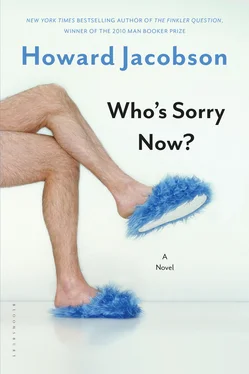Anyone watching would have picked him for the criminal, not the victim.
And who was to say they would not have been right?
To whom was an explanation owing?
Unable to employ his mind to any better purpose, he remained in his bed for two days, counting his books, counting out the days of his life in his books, feverishly reading their spines backwards, like a boy with the measles — ttebboC mailliW … IliM trautS nhoj … ecalP sicnarF … A nice description of his condition. How did he feel? EcalP sicnarF. SicnarF to death. He didn’t expect the phone to ring. If she hadn’t seen him, she had no reason to trouble herself. She was holidaying from him. If she had seen him, some explanation was owing to her and she was determinedly waiting for it. Why were you spying on me, Marvin? Why were you spying on me for a second time? The answer ought to have been straightforward: Why were you giving me reason? But the disingenuousness of that didn’t get past even him. Why was he spying on her? For the same reason that lovers have spied on one another since lovers have existed. To quiet the demons of uncertainty, Chas. Not to stir the dragons of proof, Marvin? Ah, Chas, Chas, show me the ardent lover who can tell a demon from a dragon, or who doesn’t, in the end, prefer turbulence to peace. I say an ardent lover, Chas. Do I take it, then, that your ardour is now satisfied, Marvin? He shook his head. In bed on his own, he shook his head. Soon he would be speaking words aloud, down to only himself to talk to. Satisfied? No, he wasn’t satisfied. He was as unsatisfied as it was possible for a man of exacting mental appetites ever to be. He couldn’t be jealous of Charlie, or otherwise interestingly damaged by him. Rights and precedence aside, he couldn’t get his stomach to turn over for Charlie. He felt disappointed and lonely, sicnarF to death, betrayed and made a fool of, but there was no accompanying kick in the gut. He considered himself doubly let down. She had deceived him to no perversely satisfying end. And whether she fairly owed him an explanation for that he couldn’t decide. Probably she didn’t. But she could have been magnanimous and given him something to which he had no right.
Just short of a week, he rang her.
‘What’s there to say, Marvin?’ she asked. ‘My husband has pleaded to be forgiven and taken back. And I’ve said yes. I suppose I’ve done what I always knew I was going to do.’
‘You always knew that, did you?’
Her voice was back to where it had been when she’d relieved him of his cat ttebboC. All its doors closed to him. ‘I suppose I did, yes. Surely you did too.’
He thought he might cry. It was the form of words that did it. Always the form of words.
Not the dead in their coffins, Kreitman thought, not the dead in their winding sheets in their coffins in the sodden ground are ever so finally dead as words make them.
‘I didn’t, actually,’ he said. ‘More fool me, but I didn’t.’
‘Well, there you are,’ she said. ‘We thought it would be me who’d be saying that. It should be a change for you, Marvin, delivering a sentence you must have heard a thousand times.’
He coughed, to get the teary deposits out of his voice. ‘I’m lying here,’ he said, ‘where we lay together, floating among my old useless books, reading my antiquated library from memory. And suddenly I’m reminded that when Francis Place lost his wife he was in such an agony of grief he was unable to attend her funeral. Instead he hid in the barn. “A mere child,” he called himself, “without a particle of resolution.” And he one of the most resolute men of the century.’
‘Why are you telling me this, Marvin? I’m not your wife.’
‘After her death he kept hearing her moving along the passages of the house. Or in the rooms.’
She said nothing. Kreitman wondered if perhaps she was listening for the sound of her own footfalls down the line.
‘I hear you on my ladder, Chas.’
She laughed. ‘You are one strange poet, Marvin,’ she said.
He didn’t laugh. ‘I am one lonely poet,’ he said. ‘I miss you.’
‘If I’ve hurt you,’ she said, ‘I’m sorry. But I doubt that I’ve hurt you for long, if at all. This was always a game for you.’
‘It never was, Chas. It was never a game. I take responsibility for my actions. I see them through. You’re the one, as you’ve told me countless times, and as I can now avouch with my own eyes, who accidentally falls into situations and accidentally falls out of them again.’
‘I hardly accidentally fell into you, Marvin.’
‘No, you didn’t. But you’ll think you did. At the last you’ll explain me to yourself and then forget me, as an obstacle you tripped over.’
‘Whereas for you it was all purpose and meaning?’
‘To my shame, yes. I envy you your light touch.’
She took it. He could hear her riding with the punch. ‘Well, you have your view of me,’ she said. ‘As for my view of what you’ve been doing, I’ll flatter myself that the game may have got out of hand. But it began as a game. Why deny it? Charlie’s told me of your dare.’
‘My dare?’
‘I marvel you could be so easily entertained, Marvin. It could hardly have been much of a challenge. You knew the state Charlie was in. It must have been like taking candy from a baby.’
‘Charlie told you that I challenged him? Challenged him to do what?’
‘Join you in one of your games. What larks, Charlie. You have a crack at the short chubby one, and I’ll see what I can make happen with the long bony one.’
‘He said I said that? ’
‘Or words to that effect. You’ll forgive me if I’m not able to replicate the exact locution.’
‘Did he give you any inkling as to why I might have issued this challenge, as you call it?’
‘Idleness, Marvin. You had a wife, he had a wife — why not?’
‘I had nothing better to do that night?’
‘Ah, so you do remember the night.’
‘I have a wife, you have a wife, let’s play swaps — after all these months we’ve spent together my morality still strikes you as no more subtle than that?’
‘You know what you did, Marvin. You’re a man who prides himself on knowing his own nature. A wife has never been a sacred commodity to you. Not yours nor anyone else’s. No doubt you’ll be having a laugh at my expense with the next one.’
‘The next one?’
‘The next however many …’
On the spot Kreitman made a decision. He would not tell Chas what had really happened. He would not disabuse her of her regained wifely trust. Let her think of Charlie as an easily led lost lamb, if that served the marriage. That would be his second wedding present to them both. And some sort of goodbye gift to her.
Not that she would have believed him, whatever he’d told her.
The saddest part of all, for Kreitman, that. That she would never believe him.
And Hazel?
It offended Kreitman aesthetically to be thinking about Hazel now that the Charlies were back thinking about each other. There was a moral ugliness in symmetry. Kreitman believed he owed it to himself, let alone to Hazel, let alone to Chas — to everyone, in fact, except Charlie — not to be so obvious. Yet he had been dreaming about her — hadn’t he? — prior to Chas giving him the heave-ho. He had been missing her well before missing her was the obvious thing to be doing; at a time, to be brutal about it, when missing her was anything but symmetrical.
He had always been a man who moved seamlessly from one woman to the next. Seamlessly but not heartlessly. If anything the seamlessness proved how much heart he had. Only another woman could put him together again, that was how hard he fell. Whether going back to a previous woman, if that’s any way to talk about your wife, was proof of the same emotional logic, he wasn’t sure; maybe it proved that this time he had fallen harder than ever.
Читать дальше












